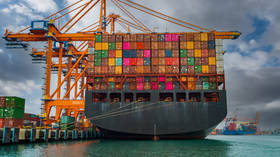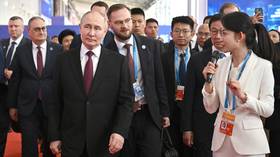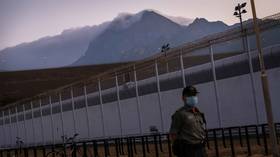Decoupling from China may be ‘impossible’ – survey

Total economic decoupling from China would be “difficult, if not impossible,” a new report by international insurance company Allianz Trade has suggested, saying that the Asian power remains a “critical supplier” for much of the world.
The survey by Allianz Trade polled over 3,000 companies in China, France, Germany, Italy, Poland, Spain, the UK, and US on their outlook for global trade in 2024.
The intensity of import dependency on China varies, with the US, UK, and France being among the most exposed. Nearly 50% of US imports from China are critical dependencies, it said.
“There is no evidence of a full decoupling from China yet,” the report said, noting that more than one-third of respondents plan to increase their footprint in China.
Despite talk of decoupling and diversifying away from China, “there is probably a limit to what extent this can happen,” Allianz said, adding that European countries remain bullish about their prospects there.
Some 39% of companies in Germany and Spain, and more than 30% in France, expect to increase their footprint in China, according to the survey. That’s compared with 27% in the US who plan to do the same.
“European companies are clearly less worried than US firms,” the report said.
The trend of diversification rather than decoupling seems more apparent, Allianz said, with a quarter of German, French and US firms expecting their footprint in China to represent “a smaller share of their global supply investments going forward.”
US and EU officials have been struggling to come up with a unified strategy on China as they try to reduce trade dependence on Beijing, which they have repeatedly accused of economic coercion.
The Chinese government, meanwhile, has claimed that Washington and its allies have weaponized trade regulations in order to advance anti-China policies and accused them of “economic bullying.”
Western officials, however, have recently shifted from the ‘decoupling’ rhetoric to that of ‘de-risking and diversifying.’ That approach was reflected in a joint communique adopted by the G7 during its summit in Japan in May, which accused Beijing of trying to “distort the global economy.”
Beijing rejected the allegations, saying the West is stuck in a “Cold-War mentality.”













